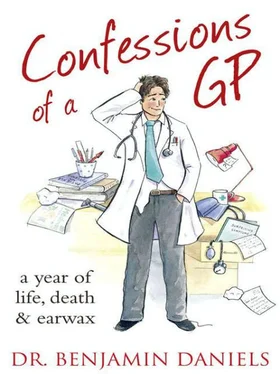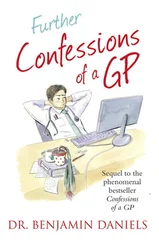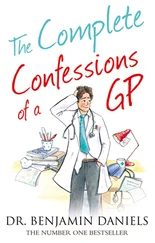One Saturday night I was working for the on-call GP service again. I was sitting in a small cold Portakabin in the main hospital car park and was covering the emergency GP calls for the entire town. I didn’t know any of the people calling up but most of the problems could be dealt with over the phone and if not I could always drive round to do a home visit.
It was actually a fairly stress-free evening and after calls reassuring a couple of first-time mums and a brief visit to see an old lady with a urine infection, I was almost ready to go home. It was nearly 11 p.m. when the phone rang and I decided to take a last call:
Patient: May I ask who I’m speaking to?
Me: Certainly. My name is Dr Daniels. How can I help this evening?
Patient: Hello, Dr Daniels. My name is Angela and I’m going to kill myself right now and it’s all your fault.
At this point the phone went dead. I tried to phone her back but the line was permanently engaged. The computer flagged up her telephone number and address but nothing else.
I had never met Angela before but apparently I was about to become responsible for her death. Even at my most narcissistic, I knew that I was unlikely to be important enough to single-handedly inspire the suicide of a complete stranger. I also very much doubted that Angela had any intention to actually die. The problem was what did I do now? I knew absolutely nothing about her. My gut instinct was that she was probably just a time-waster and the best thing to do would be to completely ignore her.
The problem was that the phone calls to the on-call doctors were recorded so if she was to be discovered dead tomorrow, I couldn’t claim ignorance. The coroner’s court case would be very embarrassing as I tried to explain why I did absolutely nothing after being told explicitly about a suicide attempt. ‘I thought she was just a bit of a time-waster, your honour’ probably wouldn’t be a very successful line of defence.
Very reluctantly, I drove to the house. As I pulled up to her address there was already a pissed-off-looking ambulance crew at the scene. They had also received a phone call threatening suicide from Angela. Nobody was answering the door and after much pointless shouting through the letter box, we grudgingly decided we really needed to break in. One of the paramedics apologetically told me that they weren’t allowed to break the door down for health and safety reasons. I would have happily kicked the door down but was held back my general weediness. We made a contrite call to the police, who, after an hour or so, came round and with irritating ease bashed down the front door with one kick.
We all charged into the house and ran into each room in turn loudly shouting Angela’s name. I dashed into the bathroom and then stopped dead. There was a woman lying in the bath. Her face was under the water with open eyes staring up at the ceiling. I could feel my heart pounding and was frozen to the spot. I assumed she was dead but then spotted a couple of bubbles coming out of her mouth. Her eyes had also moved from staring at the ceiling and were now looking straight at me. I grabbed her under the arms and pulled her up out of the water.
She was barely out of breath and looked me calmly in the face: ‘Are you Dr Daniels? You owe me a new door.’ Angela had clearly been patiently waiting for us to break the door down before sticking her head under the water.
She had evidently carefully planned the whole episode and was wearing a black swimming costume to protect her dignity for our anticipated dramatic entrance. She looked distinctly pleased with herself as she sat up in her bath with two paramedics, two policemen and me, all crammed into her tiny bathroom expectantly waiting for her next move.
I called the on-call psychiatrist.
‘Oh, Angela. We all know her a bit too well. Has she pulled one of her stunts again?’
The psychiatrist was greatly amused by my account of the evening’s entertainment. Apparently, she had made well over a hundred ‘suicide’ attempts and to date had never actually come close to causing herself any real harm. The professional viewpoint would be that Angela was a vulnerable person who struggled with effective communication and expressed her frustrations by making elaborate cries for help. One of the coppers on the scene was slightly less sympathetic and suggested that she was, in fact, a time-wasting piss artist who, after over a hundred failed suicide attempts, should have got a bit better at it by now. The psychiatrist had a chat with Angela on the phone and agreed to see her in clinic the following afternoon. I went home to bed.
I don’t like some of my patients
Marcus Smythe is one of my patients and I just don’t like him. He is privately educated and well-spoken but also has a drinking problem and beats up his wife. He is regularly rude and aggressive to the reception staff and bullies them into giving him immediate appointments that aren’t necessary. He is also rude and demanding with me and if he doesn’t get what he wants, he threatens to complain to his MP and write letters to the local paper. As each minute passes in his presence, my empathy, patience and tolerance rapidly dwindle away. During my medical school training, I learnt all about many rare diseases that I am unlikely to ever encounter, but I was never really given any preparation for how to deal with the Marcus Smythes of this world.
I love the fact that my job allows me to meet all types of people of all ages and backgrounds. It is the best part about being a doctor and of the several thousand patients I see each year, I’m rather fond of most. There are, however, one or two patients like Mr Smythe who regularly irritate and infuriate me. All doctors dislike one or two of their patients but, with the exception of occasional confessional whispers between close colleagues, we rarely admit to it. I had already been a doctor for several years when a consultant psychiatrist took me aside and told me that it was okay to dislike some of my patients. Hearing those words was like a huge weight being lifted off my shoulders. I was able to release my guilt that had been bubbling beneath the surface and eating away at me from the inside. It felt immensely liberating to now admit these feelings and reassure myself that they were normal and, in some ways, healthy. The revelation for me as a doctor was that while I now felt able to admit to myself my personal dislike of a patient, it must not stop me from treating him or her as fairly and professionally as I would any other patient.
Mark is about my age and I can’t help but like the bloke. He is friendly, funny and interesting and if he wasn’t one of my patients, I imagine he could well be one of my friends. He has bipolar disorder, which means that he can get very depressed at times and at others can become as high as a kite and dangerously manic. It is a tough condition to live with and I like to see him every few weeks to make sure everything is stable.
After a few months I’ve got to know him quite well. I know about his job and his family and his relationships. He can see the funny side of his illness and he makes me laugh with some of the stories he tells. Each time he comes to see me he asks how I am. Lots of my patients ask me this but most don’t actually want me to answer. People visit the doctor to gratefully offload in one direction only. I don’t have a problem with that, but Mark is different. We get on well and I genuinely feel that he does care how I am. It feels odd him calling me Dr Daniels rather than using my first name and I think that he would like me to take down my professional barrier and have our consultations as more like chats between two friends.
Читать дальше
Конец ознакомительного отрывка
Купить книгу











![Benjamin Franklin - Memoirs of Benjamin Franklin; Written by Himself. [Vol. 2 of 2]](/books/747975/benjamin-franklin-memoirs-of-benjamin-franklin-wr-thumb.webp)
![Benjamin Franklin - Memoirs of Benjamin Franklin; Written by Himself. [Vol. 1 of 2]](/books/748053/benjamin-franklin-memoirs-of-benjamin-franklin-wr-thumb.webp)